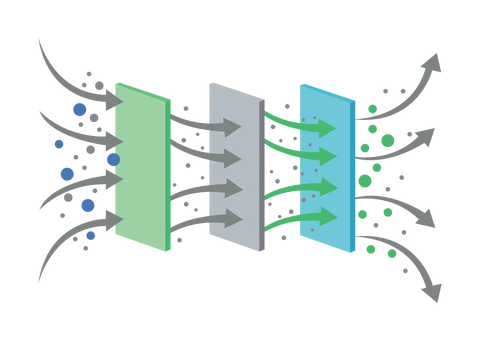No Products in the Cart

The truth is that air purifiers are not the remedy for improving indoor air quality, but the right one definitely may help one breathe a little better.
This article is a buying guide that will not only explain the basics but will also direct you to the right air purifier so that the decision process to buying one would not get anyone dazed.
What does an Air Purifier do?
Seems like a straightforward question, which it is, and a great one at that. The air purifier should aim to, well, purify the air. But only when the purpose of an air purifier is truly understood, then finding the right one becomes few steps away.
Simply put, Air Purifiers clean the air around you.
An air purifier is one way that can help to make allergy season more charming. They are the exact opposite of humidifiers and essential oil diffusers which add particles to indoor air. The air purifiers clean your air by passing it through a filtering process.
This is targeted at extracting harmful particles and unpleasant odors. Also, they filter out pet dander, mold, pollen, mold, dust, allergens, chemicals, and other common, sometimes hazardous irritants from your environment.

Especially few respiratory problems like dust allergies, asthma, COPD, filtering the air has the effect of improving the air quality and invariably helping one breathe easier.
So using an air purifier, we expect to help create cleaner, healthier air in our home so we can enjoy better indoor air quality, for easier breathing and better health.
What do Air Purifiers don’t do?
Before you opt to buy an air purifier, you must understand that air purifiers are not a cure-all.
Say, the furnishings and ventilation in your home, how are they affecting you in addition to any indoor pollutants? However, for an allergy or asthma sufferer, an air purifier with a HEPA filter could be helpful as it will be perfect for extracting fine airborne particles.
You may need to take other steps for creating cleaner air and preventing harmful particles from entering your indoor air. Steps such as replacing carpeting, washing bedding in hot water weekly, switching to non-toxic cleaning products, and other options.
Think of it this way. Just as allergy medication works with the body to help relieve your symptoms, the air purifier helps to relieve those same symptoms by averting your body from exposure to the triggers. For starters, they may help remove the source of your symptoms.
Are they that effective?
The short answer is yes. If you suffer from asthma, allergies, or have a respiratory illness, you know firsthand how airborne irritants can be painful.
Air purifiers work through a specialized filtering manner that targets tiny particles that pose harm to your wellness. The less these bad particulates are in the air, the lower the risk is that you’ll breathe them in.

Without an air purifier, you only have your lungs as filter for airborne contaminants which is why so many people get unwell.
However, if you are not a sufferer from respiratory issues, you may wonder, “So do I need the air purifiers just as well?”. You actually do. Breathing a cleaner air in your home, you will notice a dramatic improvement in your health. How?
Because a good, high-quality air purifier can trap 99% of hazardous air pollutants that would otherwise be absorbed into your lungs and nasal passage. Pre-filtering the air in this way takes a lot of pressure off of your lungs and guarantees that you only breathe in sanitary, fresh air while inside your home.
Air purifiers typically comprise of a filter, or multiple filters, and a fan that sucks in and circulates air. As air moves through the filter, particles and air pollutants are trapped and cleaner air is pushed back out into the environment.

There are various considerations as to what air purifiers can remove. Depending on whether or not the subject has a previous health condition, the type of air pollutant, and also depending on the technology used, air purifiers generally can function in:
3. Removing volatile organic compounds (VOC). Few examples of VOCs are formaldehyde, benzene, and methylene chloride. They are airborne at room temperature and can cause serious damage to the lungs, liver, kidney, and nervous system.
Recommendation: Asthmatic patients should opt for air purifiers having TRUE HEPA filters and should avoid Ozone based purifiers.
Recommendation: People who live in construction areas must ensure to opt for a purifier that has a strong pre-filter. The pre-filters should be replaced frequently. For those living in industrial areas, a purifier with Activated Carbon filters to remove the odor in the air is recommended.
Recommendation: People having pets at home should also opt for air purifiers with strong pre-filter to avoid breathing in pet hair
Recommendation: People having lower immunity levels and those on dialysis should install air purifiers of top quality with True HEPA filter, Pre-filter, etc
To put it simply: Using a quality air purifier can go a long way to relieve you of a wide variety of concerns.
When you want to buy an air purifier, you must focus on why you want one. This will make the decision process easier.
As already explained, there many indoor particulates that air purifiers have been designed to eradicate but not all air purifiers are made to get rid of every type of pollutant.
Therefore, streamlining the type of problem you’re trying to solve inside your home will help guide you in choosing the right air purifier. So consider some of the issues that you’re facing before youtry to decide on which air purifier to buy.
Let these types of questions be your guide.
How do I use my air purifier for the best results?
Inspect the square footage rating of the device that you have in mind to buy versus the size of the room that you want to use it in. After doing the simple but necessary calculations, it will direct you in the minimum square footage rating an air purifier must have to efficiently clean the air inside the room(s) of your home.
Finally, while buying an air purifierfor a bedroom, selectone that is less noisy so that you can sleep peacefully. For a sitting room, an air purifier can have variable settings which you can adjust when no one is in the room.
Hopefully, you enjoyed this air purifier buying guide on what to look for in an air purifier and how to choose an air purifier for your home!